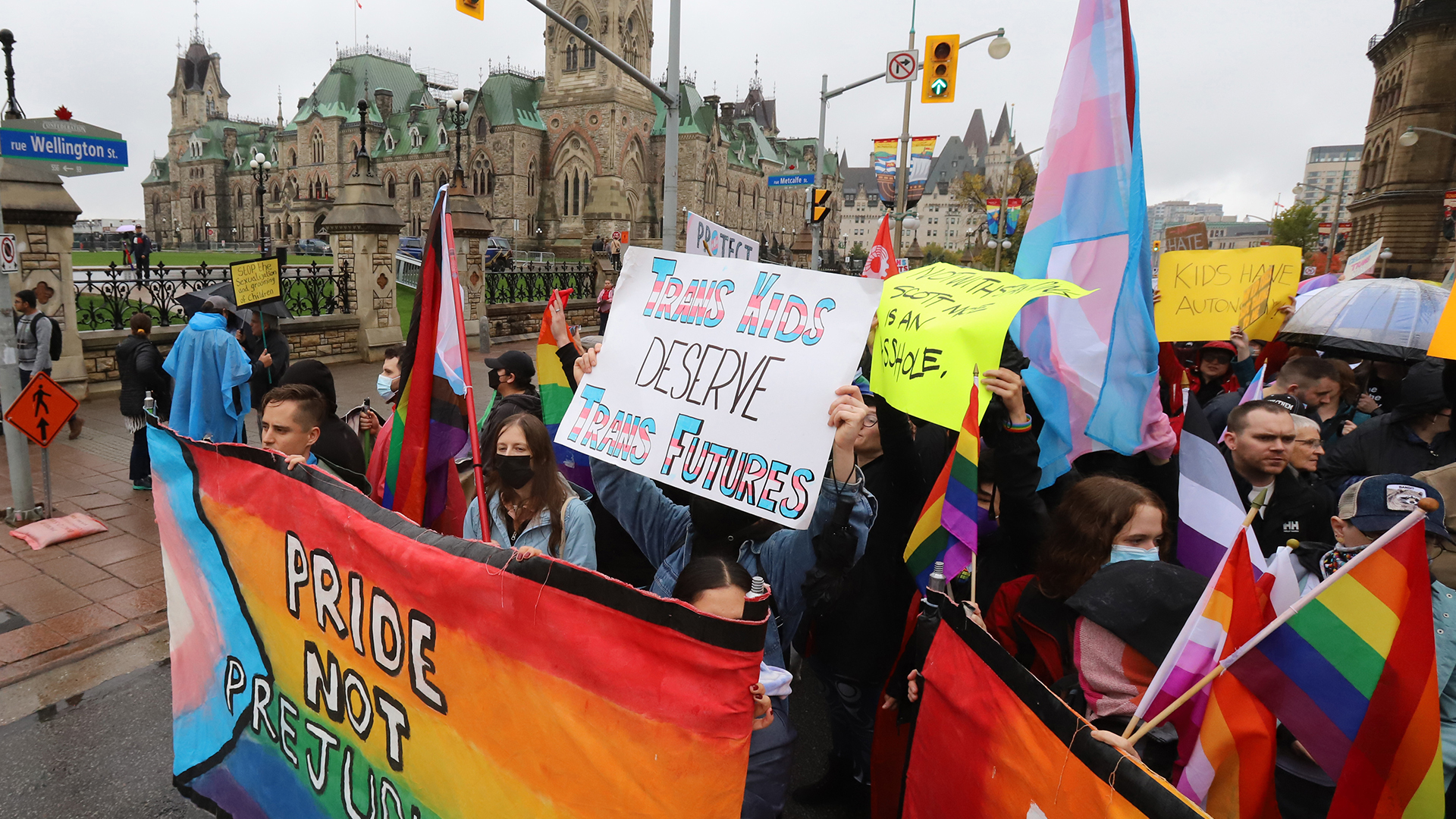
LGBTQ advocates in Canada have gradually secured their rights through hard-fought battles going back almost 40 years. That left the impression among sexual and gender minorities that social progress, while slow, was inevitable. The events of the past few months, however, have disillusioned and disheartened many.
Significant departures from historical precedents have resulted in queer and trans rights being less protected now as conservative politicians target transgender and nonbinary youth often using the language of “parental rights” in an apparent attempt to score political points.
When conservative governments respected judicial guardrails
Throughout public consultations leading to the adoption of the Canadian Charter of Rights and Freedoms in 1982, former prime minister Pierre Trudeau and the provincial premiers resisted calls from queer and feminist advocates to list sexual orientation as one of the specific grounds for protection from discrimination under equality rights in Section 15.
This was disappointing to sexual minorities who saw the prime minister as a strong ally who had championed the partial decriminalization of homosexuality during his time as minister of justice.
Despite this, many lesbian, gay, bisexual and queer people found solace in Section 15’s open-ended wording, which broadly prohibited discrimination based on personal characteristics that are difficult or impossible to change. There was hope.
After Section 15 came into effect in 1985, queer activists started bringing discrimination cases before the courts, slowly building up case law that would eventually recognize sexual orientation as being protected under the Charter.
This displeased many socially conservative policy-makers and civil society groups, who argued that like-minded governments should push back against the expansion of protection for sexual minorities by using the constitutional trump card – the notwithstanding clause.
The reaction to the Vriend v. Alberta case in the 1990s is one prominent example. Vriend had been fired as a college instructor for being gay. He successfully took the province to court, but the ruling was overturned when the government appealed.
Vriend went to the Supreme Court of Canada, which found that the province’s omission of sexual orientation as a protected category in its anti-discrimination law was an unjustifiable violation of the Charter’s Section 15.
After the court decided to read sexual orientation into the human-rights legislation, calls grew from conservative and religious groups to invoke the notwithstanding clause to avoid the “slippery slope” that they said would lead to the legalization of bestiality, pedophilia and overall sexual anarchy.
Alberta’s premier at the time, Ralph Klein, decided not to pursue the constitutional nuclear option to preserve the status quo and left the court’s decision unchallenged. He criticized anti-gay protesters for appearing too hateful in their advocacy. It appeared that the caustic rhetoric turned off many moderates, who saw the arguments as contrary to a modern, secular, democratic state.
Outside Quebec, it seemed that political interests alone would not be sufficient for governments to openly contravene one of the Charter’s most consequential clauses. That trend continued into the new millennium as successive conservative governments refused to invoke the notwithstanding clause for issues that went against many of their supporters’ strongly held convictions, notably on same-sex marriage.
Reaching for the notwithstanding clause to rile up an electoral base
If conservative governments showed grudging deference to the courts on matters of sexual orientation rights in the 1990s and early 2000s, the opposite seems to be occurring in recent years.
Despite decisions from the judiciary, as well as updated human rights laws that now include gender identity and expression as prohibited grounds of discrimination, right-leaning premiers appear more than happy to stoke the flames of populist arguments against sexual and gender minorities, but most especially against transgender and nonbinary youth.
For example, Manitoba’s former premier, Heather Stefanson, sought to rally her base by refusing to intervene in a school-board decision to ban LGBTQ content from the province’s libraries. Quebec’s minister of education insisted recently that multi-stall gender-neutral washrooms would never see the light of day in his province’s schools.
Premier Blaine Higgs’s announcement that New Brunswick will enact a policy that some argue would forcibly out gender-diverse students to their parents seems to be picking up steam, while Ontario Premier Doug Ford has likened the protection of trans youth to indoctrination by school boards. The Conservative Party of Canada’s leader, Pierre Poilievre, has played up the moral panic behind Ford’s comment.
Perhaps the most striking example comes from Saskatchewan Premier Scott Moe, who has introduced legislation similar to New Brunswick’s. Moe pre-emptively invoked the Charter’s notwithstanding clause to prevent any judicial review of the bill. If other premiers follow suit, the notwithstanding clause risks becoming an acceptable tool for right-leaning provincial governments seeking to impose their beliefs on trans youth and their families.
Trans people must be protected across Canada
Voter condemnation was once a guardrail against governments seeking to trample Charter rights, but it seems to have ceded its place to a growing appetite for the rage-baiting politics that have become ubiquitous south of the border.
It’s an ominous preview of what may become commonplace in Canada should conservative governments not change course, especially given the vocal contingent of anti-LGBTQ protesters who have taken to the streets in increasingly bold fashion.
Moreover, given the willingness among today’s politicians to use the notwithstanding clause pre-emptively, we may be entering a new era of human-rights politics in Canada in which the judiciary is bypassed entirely as some provinces seek to justify discrimination against the minority – a far cry from the promises of the Charter.
Un-Chartered territory: Where do we go from here?
What was once a source of pride for 90 per cent of Canadians seems to have become little more than an inconvenient obstacle in the way of politicians seeking to capitalize on the popularity of culture wars imported from the United States. The Charter and the protections that came with it – something that legislators of all political stripes at one time treated with great respect – appear to be weakening.
There are important debates to be had about the balance of parliamentary supremacy and judicial review, and about the best way to integrate and protect trans youth in schools. But at a time of rising anti-LGBTQ hate crimes, brushing aside our country’s most powerful tool for social progress to score political points is a dangerous path.
By failing to speak out against the voices who label queer and trans people and some educators as groomers, pedophiles and child abusers, some politicians are indirectly legitimizing discourses once considered too profane for mainstream Canadian politics. That is concerning.
Using the notwithstanding clause is any provincial government’s prerogative. But it is also the right of everyday citizens who care for equality and the rule of law to speak out. Otherwise, we will continue down this uncharted path and the most vulnerable among us will pay the steepest price.










